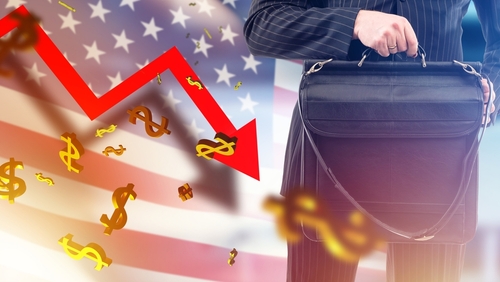Democrats are ramping up pressure on former President Donald Trump following a controversial sequence of events surrounding his 90-day pause on tariffs, which triggered a massive market rally—followed by a crash. Lawmakers are now demanding federal investigations into what they describe as a potential abuse of insider information for financial gain, possibly impacting future stock trading reforms in Congress.
Market Surge Followed by Collapse Fuels Suspicion
The controversy began after President Trump posted on Truth Social, encouraging Americans to “buy the dip” in the stock market. Just hours later, he announced a temporary pause on his aggressive tariff agenda, surprising both Wall Street and Washington.
Markets responded with euphoria. The Dow Jones surged nearly 2,000 points, and the S&P 500 climbed over 5% in one of the largest single-day gains in recent years. But the celebration was short-lived. The very next day, both indexes plummeted, wiping out most of the gains and rattling investor confidence.
Democrats say the timing was no coincidence—and they’re demanding answers.
Federal Investigations and Accusations of Corruption
Led by Senator Adam Schiff and Representative Alexandria Ocasio-Cortez, Democrats are now calling for a formal investigation into whether Trump or his associates profited from non-public knowledge of the tariff reversal.
Sen. Ruben Gallego joined Schiff in submitting a letter to the Office of Government Ethics and Trump’s Chief of Staff, requesting a full review of communications surrounding the tariff announcement. The letter also highlights Tesla’s stock bump, raising questions about whether individuals close to Trump—including Elon Musk—may have had early knowledge.
Dem Richard Blumenthal is claiming “anger is building” and Trump tariffs are going to hurt America.
Also, here is a video of talking about serving in Vietnam. The only problem is he never served in Vietnam.
Stolen Valor.
All the Democrats do is lie.pic.twitter.com/0PO7YMmieK
— C3 (@C_3C_3) April 3, 2025
Ocasio-Cortez claimed there was “interesting chatter on the floor” of Congress before the news broke, suggesting members may have adjusted their portfolios with foreknowledge of Trump’s plan.
Fueling the Push for Congressional Stock Trading Reform
This high-profile case has added new momentum to the bipartisan push to ban stock trading among members of Congress. Critics argue lawmakers and high-level officials have unfair access to market-moving information, while everyday Americans are left vulnerable to manipulated swings.
Senate Democrats are buckling down on the “insider trading” narrative👇
REPORTER: “Have you seen any direct evidence of insider trading…?”
SEN. BLUMENTHAL: “Just the indications and trading patterns….” pic.twitter.com/7bToQGfXMh
— Daily Caller (@DailyCaller) April 10, 2025
Ocasio-Cortez and several Senate Democrats say the Trump situation proves the need for sweeping reforms—including a complete ban on trading individual stocks by elected officials and their spouses.
Legal experts say that while the optics are troubling, insider trading cases involving government actions are notoriously hard to prosecute. The Securities and Exchange Commission (SEC) is reportedly reviewing the situation, but enforcement may prove difficult without clear-cut laws governing the intersection of policy and market activity.
A Pattern or a One-Off?
This isn’t the first time accusations of financial manipulation have been leveled at high-ranking politicians, but it’s rare for a former president to be the focus of an insider trading probe. Trump has previously boasted about his own market instincts and investment wins, but if investigators find proof of intentional manipulation for profit, the political fallout could be explosive.
At the very least, this case may force Congress to confront its own ethics blind spots and take long-overdue action on congressional stock trading reforms.
Whether or not Trump is found guilty of wrongdoing, the incident underscores the urgent need for transparency and accountability in Washington—especially when billions in wealth can swing with a single social media post.

